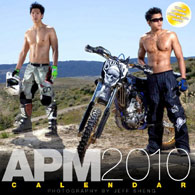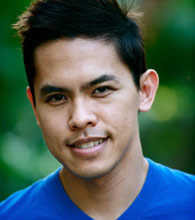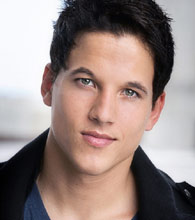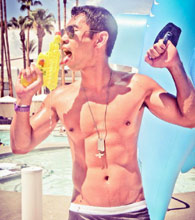The team behind the successful 2010 Asian Pacific Male Calendar that was a bestseller in the Fridae Shop and raised US$6,000 for the Asian Pacific Health Care Venture – a non-profit community health center in Los Angeles that provides low cost medicine to the working poor and uninsured – is back with a new project. This time – a reality TV series about the making of a new calendar.

Filipino-American director RD Alba together with Jason Peers and Nareth Chuon, two of the three original creators (the third being photographer Jeff Sheng whom Fridae interviewed in 2010), have just completed filming a reality TV pilot based on their experiences co-producing the calendar project, with hope that the episodes will begin production in Spring, 2012. The proposed TV series currently includes roles for Asian, Latino, African and Caucasian Americans. Actor/activist Mike C Manning of MTV’s Real World: DC fame stars in the pilot and has joined the team both as a producer on screen as well as behind the scenes.
Fridae speaks to Alba, whose directing credits include 175 episodes of a Filipino daytime television drama series Kapalaran, the feature film, Bikitma; and RSVP, the popular TV show on The Filipino Channel (TFC), about the project, setting a high bar in its castmember selection (having “walked” in a charity runway show doesn’t count as having done social service or volunteer work) and his plans beyond the pilot.
æ: Tell us more about the Passion Project and how it has evolved from the 2010 Asian Pacific Male Calendar. Which charity will this benefit?
RD: My close friends Jason Peers and Nareth Chuon created the APM calendar back in 2009 as a way to raise money for the Asian Pacific Health Care Venture, a non-profit community health center in Hollywood that provides low cost/no-cost medicine to the working poor and uninsured in over twelve, mostly Asian languages.
Fast forward a year and Jason approached me with an idea they had to turn their journey producing the calendar into a reality series. They had previously tried to shoot the pilot with another team but it didn't pan out as they had hoped for so they spent some time regrouping and re-focusing their idea and when they came to me, it just seemed like a really fun and exciting project to work on. It's not often you get the opportunity to work with people you are friends with on a fun project like this.
We haven't decided which charity we will focus on this year but there's an idea in place for the show that will allow us to highlight numerous charities nationwide. We hope to bring awareness to a diverse group of causes and hopefully help them raise a lot of money in the process.
æ: Who are the "Joe-next-doors" and how were they cast?



RD: We plan to reach out to models all over the country and want our models to not only be good looking but to have some sort of background in social service or volunteer work. When we first put the call out for guys, we had people come in and, I kid you not, when we asked one of them what their experience with non-profit work or charitable giving was, he replied "I've walked in a charity runway show before." That's not going to cut it.
æ: Tell us more about yourself and your racial/ethnic heritage? Did you grow up in the US and if so, what thoughts did you have growing up as a young Asian man and did you always want to comment through your work on the issues that affected you personally?
RD: I was born in the Philippines and moved to the US when I was 11 yrs old. My family originally settled in Philadelphia, where I attended high school. I definitely had culture shock at the relaxed way students associated with each other. Back in the Philippines, you would never see two students making out, but in Philadelphia, students kissed, held hands, did whatever – that definitely took some getting used to!
Then my family moved to Alabama, which was even stranger! I was the only Asian person for miles and was often the first Asian person people had ever met. There were a few times when I was even asked if I was black or white.
I then moved to Los Angeles, was a huge relief as it was a place where I could be myself and I could relate to all kinds of people living together in a true melting pot of a city. I'm thankful I had the experience of living in Philadelphia and Alabama as I may not have appreciated all that Los Angeles has to offer had I moved here directly from the Philippines.
æ: Who else are involved in the project?
RD: We have some really exciting people involved in this project – Carol Ann Shine, who produced the hit show Noah's Arc on Logo, has just been the most amazing person to work with. She allowed me the freedom to create my vision but also offered the support and gentle hand that was needed to make the project better. Executive producer Philip Anthony, who I have worked with on several projects (he's also my partner of 12 years) – we have our system down in terms of how we like to operate our set and deal with talent. We're very balanced in that regard. Mike Manning, who is most well-known for starring on MTV's The Real World, but who has gone on to make a name for himself in public service and non-profit work, starred in the pilot and has been very supportive of the project all along.
We have dynamic cast of individuals who all really compliment (and clash) with each other. Sikora, our stylist, is a renaissance man – he has a hit recording career and also directs videos, stars in his own web series and is an avid photographer. Our associate producer Price Troche is an up-and-coming actor who's making a name for himself in Hollywood. Our photographer is Michael Darling, who has directed several well-received films that have garnered a cult-like following. Khalif Boyd is another actor/model who serves as our on-camera production assistant. Jade Smith, who did make up on the calendar, she's back doing make up and hair on the show. Jade has her own online radio show and is the only female in the cast, which I think she enjoys! And of course, the two co-creators, Jason and Nareth.
æ: We hear that you've already filmed a reality TV pilot. How did that go and any news about how it's going?
RD: We filmed the pilot in late fall and spent the end of 2011 editing it. I think it's safe to say that it turned out better than any of us expected! A lot of that has to do with our producers but also the cast – they were all really committed to the project and that shows in the pilot. The shoot ended with a night time pool and hot tub party. Do I need to say anymore?
We recently screened the pilot for our cast and crew for the first time and it was huge hit. Definitely a lot of laughs in all the right places. For me as the director, this project is already a success.
Moving forward, we're in the beginning stages of reaching out to various networks and production companies and hope to have something in place by the end of March. It's a solid concept with a well-rounded, good looking, exciting cast and ultimately the show raises money and awareness for an assortment of non-profits in a manner that's anything but boring – oh, and there's lots of shirtless, good looking men! How do you say no to that?!
æ: Aside from fundraising, what do you hope for the project to achieve and what difference does it hope to make?
RD: One of the key elements that we carried over from the calendar to the show was that we wanted to attract more than just a gay audience. Jason told me that when they produced the calendar, they made it a point to cast a wide variety of models who would appeal to both men and women and that they made it their cause to market the calendar to both men and women. Let's face it, a calendar of shirtless men has a head start when it comes to appealing to gay consumers so they went out of their way to make sure the "looks" of each month had a cross appeal to anyone who likes good looking men – whether that be straight women or gay men or whatever. To them, getting women to purchase the calendar was only going to increase the amount of money they were able to raise for their cause. In the end, they were very successful in doing this and ended up doing about a 50/50 split with the amount of gay men vs. women who purchased the calendar – which in turn, ultimately raised their profits to be given to charity.
A lot of their success had to do with social media, where they could network to women all over the world really. I believe they ended up shipping calendars to 32 states and 15 countries on five continents. I'd say that's wide appeal. And that's something I knew we needed to carry over to the show.
Our first step to achieving that was to cast an assortment of individuals as our leads – some gay, some straight, some who knows? We have African Americans, Asians, Caucasians, Hispanics, and multi-ethnic people involved not only in the cast but working in the crew. It's really a 21st century production – and what's great is sexuality and race aren't even an issue. We don't talk about it – it's not a story line – it's just a group of people who each have a skill to offer who come together for a good cause. Everyone will be able to find someone in the cast who they can relate to or laugh with or laugh at! For me, this is what speaks volumes about the project.
When you say it's "a show about the creation of an all-male calendar," people tend to think it's just a gay show - and sure, it's going to attract a gay audience, we're not denying that, but it's very limited thinking to say it's only a gay show. How can it be just a gay show when half the characters are straight?
æ: It's often said that reality TV "fakes" it or makes things up so it appears more "real", how will this show win viewers and yet doesn't fall into those traps?
RD: Most reality shows, other than game shows of course, lack purpose. What are they doing? Oh, they're having lunch at a cafe and talking crap about another cast member. Oh, the thing they really need is suddenly missing – what will they do? This show isn't like that. There's purpose. There're people counting on our team to get the job done. And the job isn't moving coconuts from one side of the river to the other in 30 seconds on a tightrope. It's planning a calendar that will again sell in stores nationwide. It's pre-production. It's casting models. It's getting models to even know there is a casting. It's scouting locations, finding wardrobe, getting props, making sure everyone shows up to set, pulling off 13 photo shoots – and all in a limited time! And that's not even the end of it – there's getting the calendar edited, proofed, printed and out in time for the release party and model signings. There's the need to get press and all the things that go in to getting it. There're favours asked and countless obstacles to avoid but ultimately there is a goal and a point and a purpose, and other reality shows don't have that.
Let me put it this way, if we are making a 2013 calendar, the calendar needs to come out by October 2012. If it doesn't, what's the point? You can't sell a calendar in January or February. You can't sell a calendar in the summer before either. It needs to come out by a specific time when people are interested in this kind of product in order for you to even make a profit. You're working in a very limited time frame and you need to get a lot of things done, most simultaneously. The team knows this, the producers know this, I know this. In this show, you'll see the blood, sweat and tears that go into pulling something of this magnitude off in such a short amount of time. There's no time to "fake" anything and there's certainly no reason to. As anyone who has ever worked on any production knows, there will be enough natural drama over the course of production that there will be no reason to create any!
æ: What is your vision for the gay community?
RD: I always envision the gay community as an equal to the straight community, and vice versa. I hope that one day the terms "gay" and/or "straight" aren't used so generally to classify people and projects. A person is a person and being gay or straight should not define them.
æ: What's your biggest guilty pleasure?
RD: I love movies and television, and while I spend most of my time watching award-winning cinema, I also love reality shows – typically, I watch Amazing Race, Survivor and Big Brother. I'm also a fan of the low-brow ones however. My guiltiest pleasure of all-time was probably Jerry Springer back in its early years – who wasn't entertained by that show?! It gets old after a few episodes but there was never a dull moment or a dull storyline.
æ: Who would your dream date be if you were straight for a day?
RD: If I'm ever straight for a day, I'll let you know!
æ: What other projects are you working on right now?
RD: I'm currently directing a series called Food Anatomy, which is a travel food show hosted by two doctors who travel around the world dissecting the unhealthiest food. We've been on location in Tijuana, Ensenada, and San Diego and have shoots planned for New Orleans, Napa Valley, France, and many more exciting locations throughout the year.
While we were shooting the pilot for Passion Project, I was wrapping the first season of RSVP, a talk show on the Filipino Channel that I directed that showcases Filipino culture and social issues. It's hosted by Giselle Tongi, a very popular and well-known actress from the Philippines and Dr Tess Mauricio, America's Favorite Dermatologist. We were just picked up for a second season, so I'm really excited about that. We're actually returning to the Philippines to shoot the next season.
My feature film Biktima, which I wrote and directed, will be released theatrically later this year. It stars the Philippine's top actor, Cesar Montano, and Angel Aquino. The film is slated to be released theatrically later this year. The story is loosely based on the Maguindanao Massacre that happened in the southern Philippines two years ago. I'm really looking forward to sharing this story with the world.











 打印版本
打印版本



















读者回应
请先登入再使用此功能。